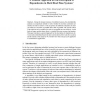Free Online Productivity Tools
i2Speak
i2Symbol
i2OCR
iTex2Img
iWeb2Print
iWeb2Shot
i2Type
iPdf2Split
iPdf2Merge
i2Bopomofo
i2Arabic
i2Style
i2Image
i2PDF
iLatex2Rtf
Sci2ools
ISOLA
2010
Springer
2010
Springer
A Scalable Approach for the Description of Dependencies in Hard Real-Time Systems
During the design iterations of embedded systems, the schedulability analysis is an important method to verify whether the real-time constraints are satisfied. In order to achieve a wide acceptance in industrial companies, the analysis must be as accurate as possible and as fast as possible. The system context of the tasks has to be considered in order to accomplish an exact analysis. As this leads to longer analysis times, there is a tradeoff between accuracy and runtime. This paper introduces a general approach for the description of dependencies between tasks in distributed hard real-time systems that is able to scale the exactness and the runtime of the analysis. We will show how this concept can be applied to a real automotive application.
| Added | 28 Jan 2011 |
| Updated | 28 Jan 2011 |
| Type | Journal |
| Year | 2010 |
| Where | ISOLA |
| Authors | Steffen Kollmann, Victor Pollex, Kilian Kempf, Frank Slomka |
Comments (0)

